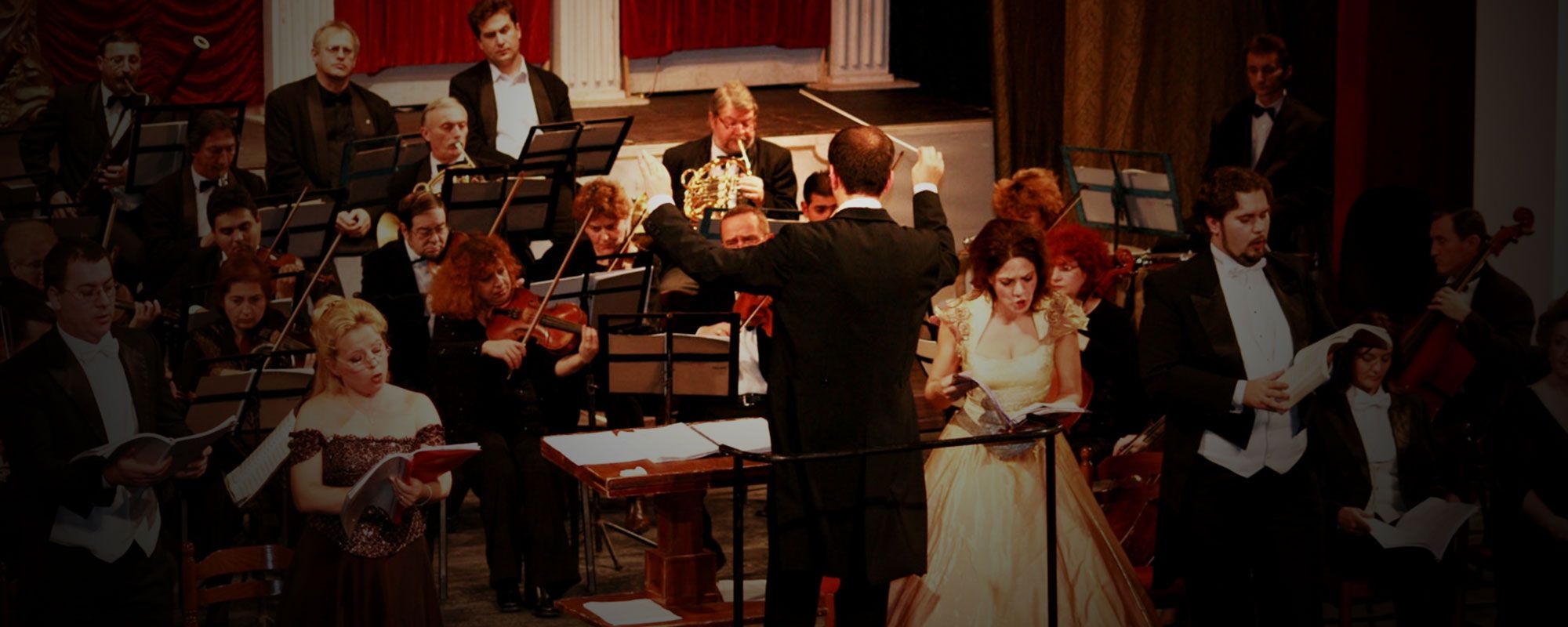The marriage of Figaro
Wolfgang Amadeus Mozart
- World premiere
- Burgtheatre din Viena, 1 mai 1786
- Romanian Opera Craiova Premiere
- 7 decembrie 2006
- Time Length
- aprox. 2h
- Extra info
- Spectacol în limba italiană cu supratitrare în limba română
Opera in four acts, composed by Wofgang Amadeus Mozart.
Libretto by Lorenzo Ponte, inspired and based on the comedy La folle journée ou Le mariage de Figaro by Pierre Caron de Beaumarchais.
Original title: Le nozze di Figaro o sia la folle giornata – The Mad Day or the Marriage of Figaro
The action of the opera takes place in the castle of Count Almaviva, in Seville, in the 18th century.
Count Almaviva, married to Rosina, but bored of her, tries to conquer the maid Susanna, Figaro’s fiancée. The count tries to prevent their wedding, helped by Marcellina, the housekeeper of Dr Bartolo. Marcellina tries to force Figaro into marrying her, in exchange for a debt he was unable to pay back to her. Figaro, in turn, tries to prevent this plan and marry Susanna. Marcellina’s plan falls apart as Figaro casually finds that Marcellina actually is his long lost mother. After many tricks and adventures, Figaro and Susanna regain their trust and love, and Count Almaviva has to ask for Rosina’s forgiveness.
ACT I
In a room of the palace of count Almaviva of Seville, Figaro measures the space to place the furniture. His fiancée, Susanna, is preparing her bridal gown. Soon, Susanna finds out from Figaro that this will be her room after the wedding. Susanna tells him that the count has been making advances towards her and sends her love letters every morning. Afterwards, Figaro is infuriated and wants to outwit the count. After the aria (Se vuol ballare, signor Contino), Dr Bartolo, the guardian of countess Rosina, comes on the stage. Bartolo is accompanied by an old housekeeper – Marcellina. She had made up a document where she asked Figaro for an amount of money, that he could not give to her. If Figaro failed to pay the money in due time, he had to marry Marcellina. Hearing this, Susanna mocks the claims of the housekeeper. However, Bartolo, wanting to take revenge on Figaro, as he had helped the count marry Rosina and had not let him marry her, helps Marcellina. Cherubino, the page, then arrives. Because of his love for women, especially for countess Rosina, he irritates the count. Cherubino says he has come in order to apologize to Barbarina, as he had entered the room, and asks for Susanna’s help. Afterwards, he declared his love to Susanna. Hearing the count, Susanna hides Cherubino on an armchair covered by a bed sheet (scene 19). The count declares his love. The arrival of Susanna’s music tutor, Don Basilio, makes her hide the count behind the armchair. Basilio intends to tell her that Cherubino is in love with Rosina. Hearing this, the count comes out and discovers Cherubino, taking the bed sheet off the armchair. Almaviva decides to punish the disloyal page, sending him to one of his regiments. Jokingly, Figaro tells Cherubino in the aria (Non piu andrai) what it’s like to be a soldier. The count then postpones Figaro and Susanna’s wedding.
ACT II
In her room, Rosina is sure that Almaviva no longer loves her. Susanna, Figaro and Rosina plan to play a trick on the count: Susanna will send the count a letter inviting him to a rendezvous in the garden, but only Cherubino, recently arrived form the army, dressed as Susanna, will go. The page arrives and serenades the countess, accompanied by Susanna, who plays the count’s guitar. However, Almaviva’s voice is heard! Susanna and Rosina panic and do not know what to do. Susanna leaves, and the countess hides Cherubino in another room. The countess refuses to open the wardrobe, which makes the count become suspicious. Together with his wife, the count goes to take the tools to break the door. In the meanwhile, Susanna opens the door for Cherubino and tells him to jump out the window. Susanna goes to the room the page had been hiding in. The count comes with an axe and is surprised to find Susanna in the room. Things turn wrong again, since the gardener Antonio comes to complain to the count that a teenager (Cherubino) had destroyed his flowers. Figaro says he is the culprit, but the count does not believe him. Marcellina, Bartolo and Basilio again postpone the couple’s wedding.
ACT III
Susanna writes a note to the count inviting him to a date in the palace garden, at night. The countess has to go herself, but dressed as Susanna. Later, Marcellina and Bartolo find out that Figaro actually was their son, and the count has to let his valet marry Susanna. During the marriage, Susanna gives him the note.
ACT IV
In the palace garden, Barbarina looks for the pin the maid’s note had been sealed with. The count had asked Barbarina for the pin, in order to give it to Susanna, as a sign of receipt of the note. Figaro sees Barbarina and soon finds out about the pin. The valet Figaro thinks he has been betrayed. Two women can be seen in the dark: Rosina and Susanna. Each one is dressed as the other. Susanna tells Figaro how much she loves him. The adventure begins – Cherubino thinks that Susanna is the countess and the count thinks that the countess is Susanna and they both declare their love to their supposed women. Figaro knows who his wife is, because of her voice. Susanna and Figaro laugh as they see that the count has been tricked. Almaviva apologizes to the countess for his unfaithfulness, and Figaro and Susanna are happy again.
*Grigore Constantinescu & Daniela Caraman-Fotea, Ghid de operă, Bucharest, 1971
**Ana Buga & Cristina Maria Sârbu, 4 secole de teatru muzical, Bucharest, 1999
***Ioana Ștefănescu, O istorie a muzicii universale, Vol. IV, Bucharest, 2002

